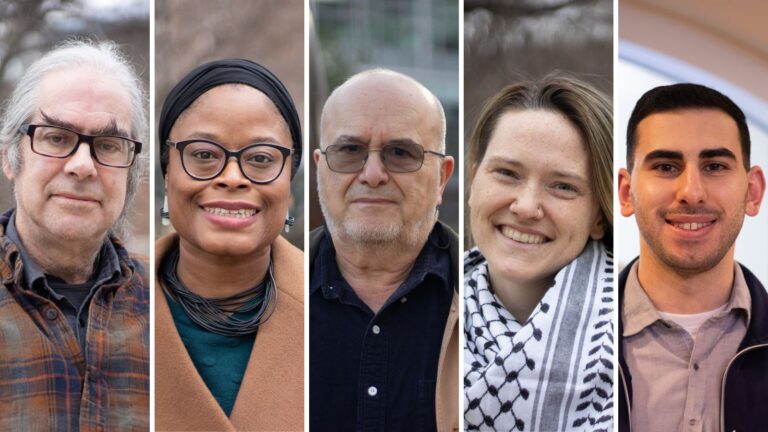The call for a ceasefire in Gaza is growing louder both internationally and locally in Champaign-Urbana. This past Monday, the Urbana city council saw a large turnout of residents looking to discuss a proposed resolution to end the conflict in Gaza. The move comes after local representative Budzinski met with Palestinian community members, subsequently advocating for peace via social media.
“Unfiltered” is a series of voices in the Champaign-Urbana area giving their opinions on a ceasefire for Gaza. Three voices will be aired Friday Morning: An Israeli-American, A white queer woman, and an American-born Palestinian. Then later that day, two voices will be aired: a Black Muslim woman and an American-Jew .
If you would like to share your thoughts and be a part of the series, leave IPM a voicemail at 217-300-2121.
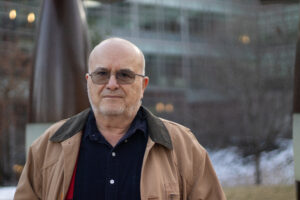
MARC SNIR: My name is Marc Snir. I am a professor emeritus at the university, a dual Israeli and US citizen. I’ve been living in US now for 35 years. Before that I lived in Israel. I was in uniform in two wars is the six day war and in the Yom Kippur War. In Israel, I always have been a peace activist interested in seeing how we get into a two state solution.
There are many things that I don’t like in what is happening, of course, it’s terrible to see the suffering in Gaza. Of course, it’s terrible to see what happened in October 7. But what’s for me most terrible is that the two sides in this conflict seem increasingly disinclined to believe in a peace. Hamas is clearly stating that it wants to see the end of the State of Israel. People in the Israeli government is clearly stating, they don’t want to see a Palestinian state ever happening. Both sides are rejecting any compromise. And that’s for me is the main tragedy of what’s happening today in the Middle East.
I would want the resolution of the Urbana city– should such resolution indeed be voted on – not only to ask for the end of the suffering in Gaza, but to ask for the two sides to sit together and to work towards a solution that satisfies the national aspirations of Palestinians. And of Israel. I want the Jewish state to continue. And I would love to see a Palestinian state live in peace near this Jewish state.
City of Urbana should think of how it can contribute to this dialogue, how it can bring the two sides sitting together and discussing their vision, other than creating more and more dissension more and more disagreement more and more feeling of unhelp of being helpless on both sides of this conflict.
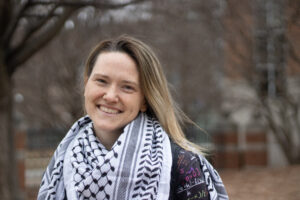
ELIZABETH SOTIROPOULOS: My name is Elizabeth Sotiropoulos. And I identify as a white queer woman who was raised Baptist and then became Orthodox Christian. And while I’m no longer a practicing Christian, I have been a part of different communities with different attitudes towards Israel, and Palestine.
Another part of my identity that shapes my view on a ceasefire resolution is that as an older infant, I became a ward of the state and I was placed in the foster care system. And then I was adopted when I was one, I was raised in a closed adoption, which means I did not know where I came from. I didn’t know anything about my biological family. All of this is rooted in an exploitative for profit system that serves people with money over serving families in need.
So when I think of Israel’s occupation of Palestine, and any form of colonization, that displaces people from their land and separates children from their families, I can relate from my own lane, of course, to this pain. And I see the parallels of greed and the legacy of trauma but certainly on a much larger and more violent scale than I ever have.
My own experiences of not knowing who and where I come from, and not knowing what my background is. And the pain of reuniting with my family after decades of being disconnected from them. Makes me feel especially passionate about supporting people who want to live in their homes in peace with their family, without being controlled by an oppressive government.
So I support the ceasefire resolution locally here in Urbana, because it sends the message not only to the world, but also to our community that we value human life, family preservation, human rights, anti racism, and social justice over capital and white supremacy.
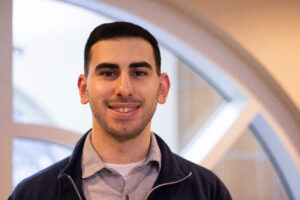
BARAA SAADA: My name is Baraa Saada. I’m an American, of Palestinian descent, and my identity is I’m from Champaign-Urbana. In terms of the importance of a ceasefire and why I’m advocating for a ceasefire, especially here, in the Urbana city council and with Urbana in general, is because we’re watching one of the greatest humanitarian disasters come apart here in our like, in this century, there’s been over 30,000 people who have been at this point killed, and countless more others who have been injured.
The reason why I think it’s important for us, in Urbana Champaign, to stand up for it. And to call for a ceasefire is because it’s actually affecting a lot of the community members here personally, for me, it’s affecting my family, my mom has family back in Gaza. She’s actually from there. And that’s where my grandmother was from, and my grandpa was, as well. And that’s where they met. And at this point, we have family there. And we’ve gotten to hear because they’re from the north side of Gaza. And we’ve gotten to hear how they’ve had to move from the north to the middle to Khan Yunus down south now to what’s been talked about a lot in the news, Rafah. And we could hear the fear in their voices, as they’re not able to eat often, don’t know how they’re going to feed their kids, don’t know when they’re going to die. And as they send us the text messages that’s like, Oh, we don’t know if we’re gonna see you again. And when we tell them, Oh, we feel bad, we don’t know what to do. They tell us: be strong. And it’s, it’s kind of funny when somebody who’s being attacked with bombs tells you to be strong. But it emphasizes that we also have a role to play in this conflict.
For us specifically, for the amount of tax dollars that they’ve sent for each Urbana resident, and in – our Champaign Urbana residents around like $34 per person. That means each of us is contributing something to it. And a ceasefire doesn’t mean that you’re supporting one side. it basically means you’re saying, hey, let’s just put down all the weapons. And let’s have a discussion, let’s see what we could do to move forward. And in this case, that’s the best thing that we could do at this point, to make sure that all the civilians are protected, no matter on what side, all civilians, all hostages, and at the same time to ensure that we could take the right steps for a better future, because you can’t sit down at a negotiating table while you’re actively in a war. That’s not usually how you end up getting a long term lasting peace, especially as, especially if you’re trying to get something out of it or have a resolution to it.
So I think, even though I have personal connections to it, there are also countless others here in the community who also have family in Gaza, and have been directly impacted by it. And for those who aren’t. There’s a lot of them who have friends or families who are. they might be your neighbors, they might be your friends, they might be your colleagues. Lots of people we know are being affected by it. And here in the Champaign-Urbana community, we have a lot of history. Lincoln has visited this place multiple times throughout the years. And then we’re taught here in the Champaign Urbana School District, that oh, we need to follow the examples of leaders such as MLK, Malcolm X, Gandhi, and it’s not. So we saw how At those times, even though what they’re fighting for, everybody’s like, Oh, that’s easy. That’s right. Why didn’t everybody fight for it? We’re witnessing it now here and 2024.
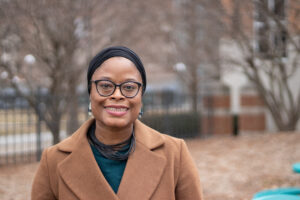
EVELYN REYNOLDS: My name is Evelyn Reynolds, and my identity, I would say that I’m African. But I also would accept black, and maybe black American, but I would prefer African or black. And while that identity is very significant, in how it shapes my life, personally, and the way that I engage in the world, when it comes to the ceasefire, though, I think the most important thing for me is my humanity. And just recognizing the fact that I’m a human being with feelings and emotions, and cognitive thoughts and things like that. And that is what makes me sympathetic to, you know, these horrible images and graphic scenes, you know, that’s splashed across our social media in particular, because the mass media isn’t showing so much of that.
Those are the things that really pull at my heartstrings first, is my humanity. And then absolutely, my identity as a black person, or an African, a person of African descent living in this country has certainly shaped my outlook on Palestine, and also my outlook on conflicts all over the world. Because it resonates. right? I think, you know, and it shouldn’t just resonate for me, because this isn’t just– because this reflects some aspects of Black History of the United States or African history, but this is US history as well. The fact that we are living in a country that was colonized.
There were people here before, you know, Europeans arrived, and they claimed the land and, you know, killed off the people and took the land, and, you know, divided it all up and renamed it. This is the United States, right? This is US history. And so all of us, you know, need to really understand that part of it. And understand what that means, because that is one of the most significant connections to, you know, what’s happening in Palestine, and really what’s fueling conflicts all over the world.
You know, it’s it’s countries like the United States, like Israel, like Britain, France, you know, that are all over, you know, South America, and Africa, and the Middle East, you know, extracting resources, mineral resources, and most cases, like in Africa, and in other places, it’s land. And that’s the resource that they’re, you know, that they’re, that they’re taking. And so that’s what we’ve seen.
I’ve read about this to better inform myself about the Palestinian struggle, and I do see it now as a decolonial resistance struggle. And I think that that’s the natural conclusion. And that’s an honest conclusion, when you study history and look back over the last 75 plus years, and also realize and admit to the fact that Israel is a social construct, that there was no Israel before 1948, and that there were people living in that particular part of the world, and those people had to be displaced in order for the State of Israel to be constructed.
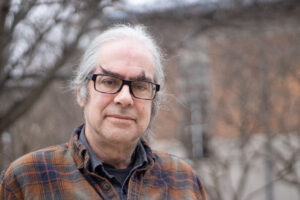
STUART LEVY: I’m Stuart Levy. And I’m an American Jew. And I support in some form of ceasefire. I think this is an important issue for us. I guess I come to this several ways. One is that during the Iraq and Afghanistan wars after the September 2001 attacks, I became part of a local peace group– aware– and learned a lot from what other– from others in the group, and from what we read, and I came to have some understanding of what war means to people.
Chris Hedges says it or is industrial murder. And there is not a path to peace through violence. Let’s see. As for how I see the conflict, I am not a Zionist– It is not unreasonable for the Jews to say that there should be a safe place for Jews. It could make sense either for Jews to live in the diaspora or in a country. But if the means of acquiring that country is through injustice, that’s not the right way. Jews are to abhor injustice. And there has been not only in the current hot phase of the – of this war, but for many decades before. Israel, the country has been displacing and violently repressing the indigenous Palestinian population that had been there long before.
So this is a hot phase of a long conflict. You know, every few years we would see mowing the lawn where an uprising would be violently put down. And those were all unjust. This phase is much more unjust than the last. Hamas committed an atrocity – they did – in attacking civilians. Israel now is committing a much greater atrocity. And it needs to stop

